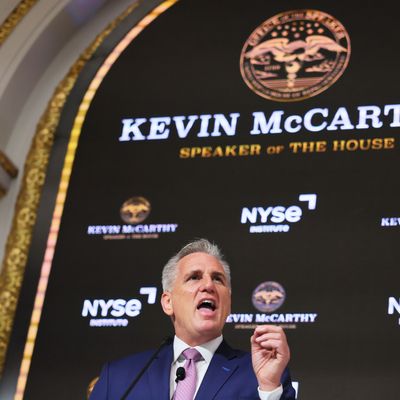
When Kevin McCarthy won the House speakership in January after a humiliating 15-ballot contest, he already knew his slippery grip on the gavel would depend on how he handled a debt-limit fight with Joe Biden and the Democrats. It’s now clear that the preliminary rounds are going very poorly for McCarthy.
He began with a huge obstacle to any actual negotiations with the White House or Senate Democrats over conditions for a debt-limit increase or suspension. As my colleague Jonathan Chait pointed out, since 1990 congressional Republicans have categorically refused even to consider tax increases of any sort as part of a solution to the deficits and debt they profess to abhor (at least during Democratic administrations). Subsequently, they haven’t really tried to negotiate on fiscal policy; they’ve made unilateral demands and tried to take hostages.
But McCarthy’s situation is far worse than that of his hostage-taking predecessors such as Newt Gingrich and Paul Ryan. He has found it impossible to achieve consensus within his own caucus over a clear list of spending-cut demands. And Biden has very skillfully forced Republicans to repudiate their most unpopular positions, notably the ancient GOP desire to “reform” (i.e., cut and privatize) Social Security and Medicare. So even as Biden and the Democrats consistently called for enactment of a clean debt-limit measure without conditions or drama, and the administration released a full budget proposal, McCarthy and his House Republicans have been unable to come up with much of anything specific, other than ruling out Social Security and Medicare cuts and bickering among themselves about defense spending.
So with time beginning to run out for dealing with the debt limit, McCarthy chose to take his weak and vague position and present it as a tough-minded and specific set of demands with a speech aimed at the GOP’s financial-community friends. At the New York Stock Exchange on Monday, McCarthy said Republicans “want Congress to place limits on federal spending, claw back COVID-19 aid, and require Americans to work to receive federal benefits,” as The Wall Street Journal put it.
The Hill explains what that means:
The Speaker said the forthcoming plan will seek to limit federal spending, with proposals to return discretionary funding levels to 2022 levels “and then limit the growth of spending over the next 10 years to 1 percent of annual growth,” without “touching Social Security and Medicare.”
The proposed “limit on federal spending” is actually just a cap on discretionary spending (i.e., not to entitlement programs) and does not distinguish between defense and nondefense spending. “Caps” like this are what you propose when you literally have no clue what to propose; future Congresses will have to figure out what it means. The only specifics — the COVID clawback and toughened work requirements for benefit programs like SNAP — are boilerplate conservative policies that please the GOP base by tormenting poor people and state and local governments and apparently do pretty well in focus groups.
Compared with an actual spending plan or a federal budget, McCarthy’s “proposal” is laughable. But with House Freedom Caucus members, who value partisanship above all else, able to depose him at the drop of a hat (in the most humiliating concession he made to become Speaker), McCarthy took this weak tea and tried to make it sound like a slug of tough medicine, as The Hill notes:
In his pitch to Wall Street to cut spending, McCarthy said he had “full confidence” that reducing federal spending would help “grow our economy” and “end the dependence on China.”
“We will curb inflation and we will protect Social Security and Medicare for the next generation, and America will be stronger for it,” he said. “If you agree, don’t sit back, join us.”
Now that he has talked tough on Wall Street, McCarthy can go back to the very difficult task of turning this proposal into something he can actually get his members to approve with virtually no margin for error, particularly since some of the more extreme members of his conference don’t even believe a debt default would be especially problematic as long as bondholders are paid. If he fails, there might be just enough House Republicans unwilling to trigger a default and a potential global economic catastrophe to force McCarthy to cave and allow a debt measure to get to Biden’s desk with or without token concessions made to save the Speaker’s face and gavel. He and his party really need a fiscal plan B that’s more viable than destructive threats and empty posturing. Right now, as they say in Texas, McCarthy is all hat and no cattle.
More on politics
- What We Learned From the House Ethics Report on Matt Gaetz
- Everyone Biden Has Granted Presidential Pardons and Commutations
- Trump Is Threatening to Invade Panama, Take Back Canal






























